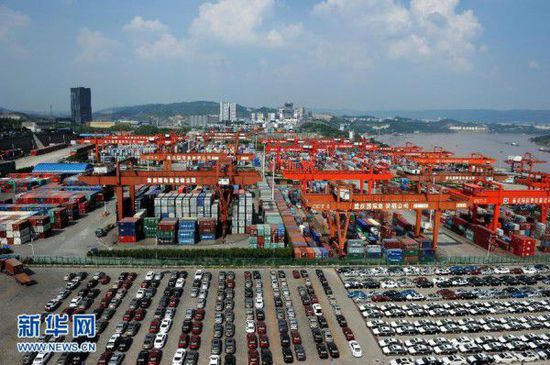Moody misunderstands Chinese economy
- By Yu Yongding
 0 Comment(s)
0 Comment(s) Print
Print E-mail China.org.cn, July 28, 2017
E-mail China.org.cn, July 28, 2017
|
|
|
China's national debt-to-GDP ratio is not relatively high among emerging economies. [Xinhua] |
Moody's recent downgrade of China's sovereign credit rating has thrown the spotlight on the country's debt issue, but is the rating fair?
In fact, China's national debt-to-GDP ratio is not relatively high among emerging economies. Its household debt burden and government debt burden are also at a moderate level. But debt is a problem among enterprises, as China's corporate debt-to-GDP ratio was registered at 170 percent, ranking the highest in the world and twice as high as the United States. Besides, China's corporate leverage ratio, which is the ratio of debt to equity, is also on the rise.
The high corporate debt-to-GDP ratio and the rising corporate leverage ratio might degenerate into financial disasters in three ways. First, it will harm financial institutions' capital quality, causing the affected capital to depreciate. Second, investors will refuse to accept delayed payments for short-term debts, which will worsen the debtors' financial situation, and lead to a rise of non-performing assets. Third, banks and financial institutions without sufficient capital will face bankruptcy and cause panic and chaos in the financial sector.
However, this is not the top concern for China, at least not so in the near future, because China is capable of handling such a high debt-to-GDP ratio with its high saving rates – total bank deposits account for 48 percent of the national GDP.
Besides, most debt in China is between state-owned banks and state-owned enterprises. This allows depositors and investors to feel that their assets had the extra guarantee of the government, which, with great financial power and total foreign exchange reserves of some US$3 trillion, can save troubled banks and prevent chain reactions.
Also, the Chinese government has maintained certain controls on capital accounts. This will help it prevent illegal capital outflows and provide time to tackle unexpected financial incidents.
Given these facts, although China's corporate debt-to-GDP ratio is high, deleveraging is not the most pressing issue right now, because there is another task on the priority list which may be affected if the deleveraging process happens too fast.
Over the past years China has suffered from deflation caused by overcapacity. In addition, the government has launched a spate of policies to prevent the real estate market from overheating, which could set back investments and lead to deflation. Under this situation, a wrong decision will lead China into a vicious cycle of greater debt and further deflation. This will do greater harm to China's economy than a high debt-to-GDP ratio.
Moody contends that the debt-to-GDP ratio poses a serious challenge to China. It argues that the current efforts made by China to maintain growth momentum will lead to a rise in debts.
But Moody understands the situation incorrectly. It fails to acknowledge the influence of China's growth potentials. When an economy is developing at a rate suitable for its potentials, which is just the case of China now, there is no need to lower the economy's growth target.
In contrary to Moody's analysis, economic stimulus policies are necessary for China. The current overcapacity is partly the result of insufficient demands and excessive investments. Ideally, decision makers should solve the problems by stimulating household consumption, and stimulating infrastructure investment, even if these policies may result in higher debt-to-GDP ratios.
The government should improve the financing services for medium-and-small enterprises, and address the high corporate debt-to-GDP ratio by improving capital's efficiency and increasing corporate profitability among other measures.
Debt is undoubtedly a problem for China, but before solving this problem, China needs to maintain its growth momentum or at least narrow the gap between the reality and the growth potentials, thus preventing more debt and further deflation.
China can cope with the situation right now, but it really needs to solve the two pressing issues before one of them becomes irreversible.
The author is an economist of the Chinese Academy of Social Sciences. He used to be the president of the China Society of World Economics, and a member of the Monetary Policy Committee of the People's Bank of China.
The article was written in Chinese and translated by Chen Xia.
Opinion articles reflect the views of their authors only, not necessarily those of China.org.cn.







Go to Forum >>0 Comment(s)